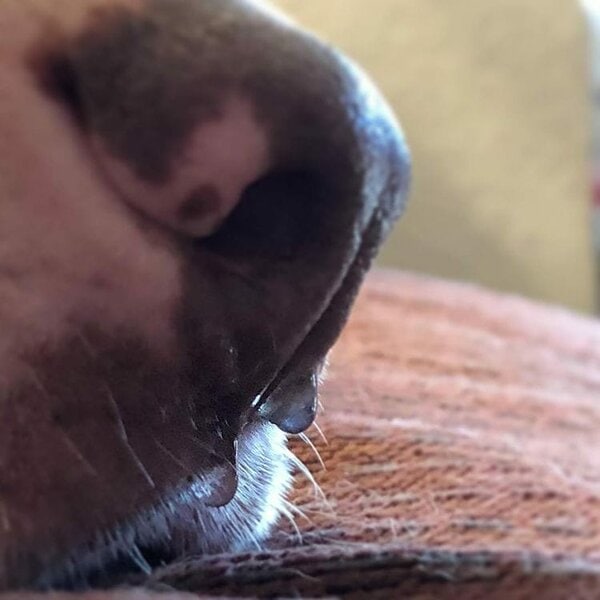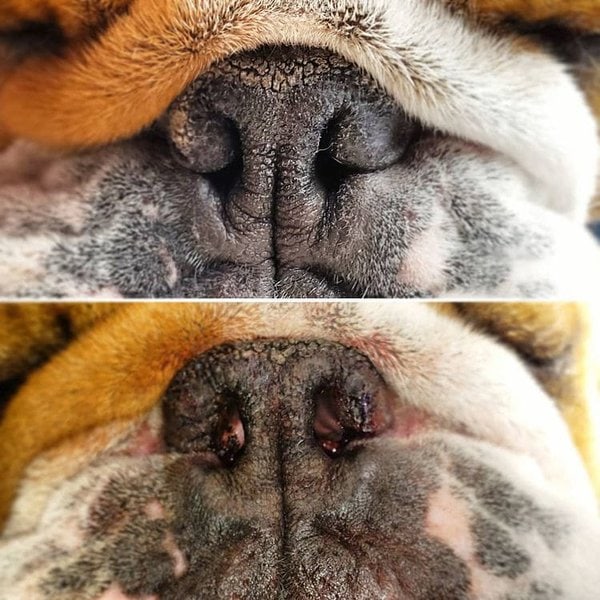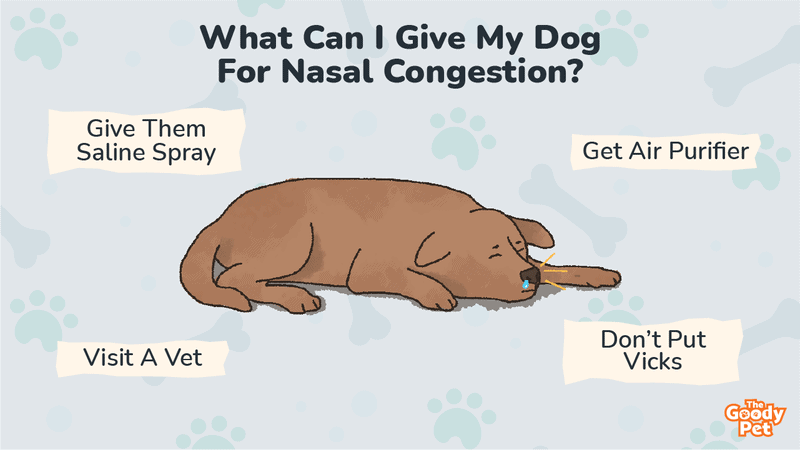Watching your canine buddy come down with a stuffy nose is difficult. A blocked nose can be a great source of discomfort in dogs no matter their size or age.
When you notice strained, noisy breathing, naturally, your first thought will be how to unclog your dog’s nose. There are several safe ways to resolve symptoms of dog nasal congestion including over-the-counter decongestants, herbal supplements, maintaining clean air in your home, and serving your pup a wholesome diet.
Before administering any treatment, it helps to first understand the signs and symptoms of respiratory distress in your dog including a peculiar symptom known as reverse sneezing. Ideally, you should take precautions to prevent nasal congestion long before it happens and we will take a look at how you can do that in a bit. But first, let’s find out the main reasons why your dog can suffer from a stuffy nose.
What Are The Causes For Stuffy Noses In Dogs?

Just like humans, dogs too can get stuffed up noses. The scientific term for stuffy noses in dogs is rhinitis, the inflammation of the mucous membrane in the nose.
Inflammation makes it difficult for the nasal membrane to filter out harmful elements such as viruses, parasites, bacteria, and allergens.
A stuffy nose can be acute, for example when a foreign body is lodged inside the nasal cavity, or chronic when it is caused by a virus or allergen.
Several factors can cause dear Fido to suffer from a stuffy nose. The most common ones are:
Viruses And Bacteria
Mobilivirus, adenovirus, and parainfluenza are among the viruses that can cause nasal inflammation in dogs.
Several bouts of infection will expose your pup to serious respiratory diseases like tracheobronchitis.
Allergens
Pollen, dust, and hay can trigger allergic reactions that cause the nasal membrane and sinuses to swell. Sudden rhinitis can also occur if your dog inhales toxic gases and smoke or if objects get stuck in the nasal passage.
Foreign Bodies
Fido can develop a stuffy nose as a result of fungi or parasites such as the botfly. Tumors and cancerous cells can also cause abnormal tissue growth in the nasal membrane, leading to a blocked nose.
Dental Problems
Dental disease can predispose your pup to rhinitis and sinusitis. When an abscess or a pus sac caused by bacteria forms in the root of the dog’s upper teeth, the infection can spread to the nasal membrane and cause a stuffed-up nose.
What Are The Signs Of Respiratory Distress In A Dog?

If it sounds like your dog has a stuffy nose, it could be a sign of rhinitis or sinusitis, respiratory diseases that can become serious if not treated early.
Look out for these severe signs of respiratory distress:
Excessive Sneezing
If your dog is sneezing more than usual, it could be due to an allergic reaction, a foreign body lodged in the nose, or an infection.
Nasal Discharge
A greenish-yellowish nasal discharge accompanied by a bad smell, coughing, and nose bleeding indicates that Fido is suffering from a fungal, viral, or bacterial infection.
Labored Breathing
Labored breathing, also known as dyspnea, can quickly become life-threatening. Your pup will noisily breath with an open mouth, nostrils will flare, and the neck will hang low and extend out.
Other low-key, non-severe symptoms to keep an eye on include:
Rubbing Or Pawing At The Face
Allergens such as dust mites, pollen, mildew, and mold spores can cause your furry friend to rub and paw at the face.
Lack Of Appetite
Dogs can go several days without eating but it is best to take early action if yours is not feeding well and shows other symptoms of respiratory distress.
Restlessness
Fido will show signs of restlessness as an accompanying symptom of illnesses such as rhinitis and sinusitis.
Reverse Sneezing
Reverse sneezing is a less severe form of sneezing but it is common among dogs with respiratory disease. Your doggie will backward sneeze to dispel irritants lodged in the soft palate close to the trachea.
Dog Nasal Congestion And Reverse Sneezing
Nasal congestion in dogs occurs when the blood vessels and mucous lining in the nose swell. When this happens, your pup can have difficulties breathing.
A common symptom of nasal congestion is reverse sneezing.
Reverse Sneezing
Inflammation in the nose can affect the dog’s upper respiratory system including the trachea and soft palate. The soft palate is a small muscle at the back of the roof of the mouth that helps with breathing, swallowing, and producing sound.
When the soft palate is irritated, the trachea narrows, making it difficult for your pet to inhale enough air. In a normal sneeze, air is pushed out through the nose but during a reverse sneeze, your pup will rapidly inhale through the nose, resulting in a loud, startling snort.
An episode of reverse sneezing typically resolves within thirty seconds and will not cause any major side effects. A few gentle rubs on the neck should calm dear Fido.
Causes Of Reverse Sneezing
Dogs reverse sneeze to get rid of irritants such as dust, nasal mites, foreign objects, and pollen trapped in the soft palate and trachea.
Other factors that can cause irritation are excessive exercise, overexcitement, and a long soft palate common in brachycephalic dogs.Occasionally, nasal tumors can cause respiratory distress and backward sneezing.
Reverse sneezing is generally harmless. However, when it occurs alongside other symptoms such as a stuffy nose, you should have a veterinarian examine your pooch. Allergy and blood tests, or X-rays can help to diagnose the backward sneezing.
What Can I Give My Dog For Nasal Congestion?
Decongestant medications, also known as antihistamines, can aid in relieving the symptoms of allergies.
When your pup has an allergic reaction, the immune system produces histamines. Histamines act as a defense against irritants but they trigger reactions such as sneezing and runny noses. Administering a decongestant in the proper dose can minimize the effects of histamines.
Allergy medication for pets is quite similar to the medicine used to treat flu and cold in humans. However, not all decongestants we use are safe for canines.
You should avoid giving your pooch medicines that contain sleeping aids and pain relievers. These can have adverse effects such as confusion, restlessness, weakness, seizures, and even sudden death.
Benadryl For Nasal Congestion
A common over-the-counter medicine for treating nasal congestion in dogs is Benadryl.
Benadryl works by blocking the histamine receptors in the body. This reduces the symptoms associated with allergies such as a runny nose and reverse sneezing.
Benadryl is generally safe but it is best to first consult your veterinarian before giving the medicine to your dog. Possible side effects include increased heart rate, fast breathing, excessive production of saliva, and vomiting.
You should not give Benadryl to a dog that is pregnant, has low blood pressure or has been diagnosed with a cardiovascular disease.
If you are looking for safe medicine for nasal congestion, SafeBay is an excellent addition to your pet’s emergency kit. This supplement contains naturally grown herbs such as calendula, elderberry, and mullein leaf that help ease nasal blockage fast.
What Else Can I Do To Prevent Nasal Congestion In My Dogs Again?
You can prevent nasal congestion before it happens by minimizing allergens in your house and in the environment where Fido spends time.
Air Purifier For Pets
A good place to start is with an air purifier. This inexpensive tool will remove dust, smoke particles, dander, and pollen from the air, allowing your pet to enjoy clean air and avoid respiratory problems.
The TaoTronics HEPA Air Purifier is one of the best options for air purifiers. It comes with a HEPA filter to trap minute dust particles and an activated carbon filter that absorbs gases and odors so you can breathe healthy air.
Vacuum Cleaner
Regular vacuuming also helps to reduce allergens that cause nasal congestion. If you don’t have time to vacuum every day, opt for a hands-free robot vacuum that keeps the floors clean even when you are away.
A robot vacuum that is worth checking out is the eufy BoostIQ RoboVac.
This compact vacuum has a strong suction power of 1,300 Pa and does a great job of removing minute dust particles, dander, and bacteria from medium-pile carpets and hard floors. You will have peace of mind knowing your doggie is safe from allergens that could cause respiratory issues.
Healthy Diet
Lastly, to keep illnesses away, nothing beats a healthy diet.
Give your dog the highest quality of food. Choose meals with real whole-food ingredients and keep in mind the stage of life whether your dog is a puppy, adult, pregnant, or nursing. It always helps to consult your veterinarian about the specific nutrients Fido needs.
For that, we personally recommend Pet Plate for its excellent and nutritious dog food formula that provides holistic and balanced meals for your dogs. Read our exclusive review on Pet Plate right here!
Related Questions
Can I Flush My Dog’s Nose? A saline spray squirted up the nose will help break up secretions in the nasal passage of your dog. Flushing your dog’s nose can provide some relief from congestion. However, this process is best done by a veterinarian who will first determine the cause of the congestion before giving your pup any medication.
Can I Put Vicks On My Dog Nose For Nasal Congestion? While Vicks rub can help ease respiratory ailments in humans, you should never put Vicks on your dog to treat nasal congestion or any other illness. The camphor, menthol, and eucalyptus ingredients are extremely toxic and will cause Fido serious side effects such as vomiting, seizures, and deadly respiratory problems.
Can You Give A Dog Human Decongestants? Given in the right dosage, some human decongestants are generally safe for dogs but possible side effects may include hyperactivity and drowsiness. It is best to first ask your veterinarian about the safety of an over-the-counter treatment. After all, humans and pets have different chemical compositions. What works in people could be harmful to animals.





